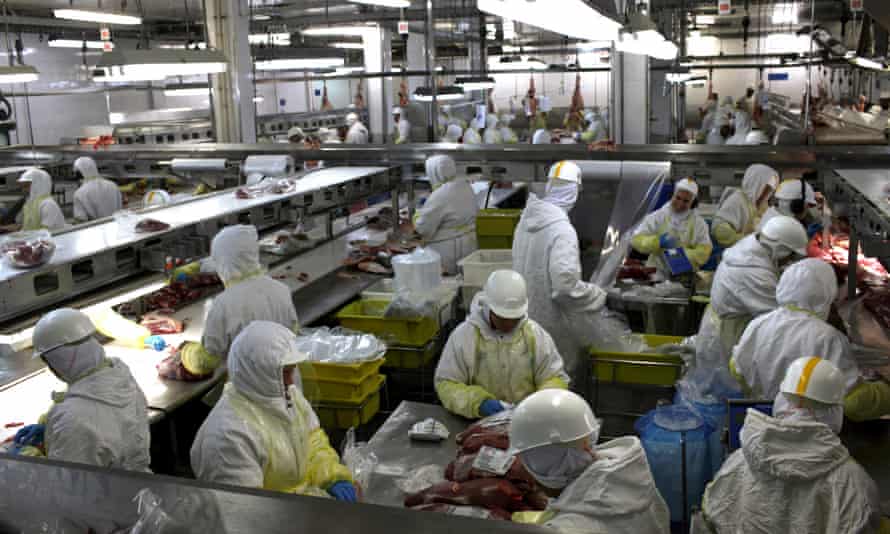The health of hundreds of thousands of meat plant workers in Brazil is at risk from an industry-backed plan to reduce breaks given to employees, say workers’ rights groups in the country.
In the midst of a pandemic that has claimed the lives of more than 350,000 Brazilians, President Jair Bolsonaro’s government, parliament and the meat industry have been pushing for a move to review the laws and regulations protecting workers at slaughter plants.
New rules under discussion would limit the regular breaks given to workers enduring cold temperatures, which labour specialists say helps reduce the potential for injury.
“It is inconceivable that during the worst health crisis in history, when slaughterhouse workers were qualified as essential and continued to work normally to guarantee the supply of food to society, they should have any rights related to health and safety at work removed,” said Lincoln Cordeiro, who works for the Labour Prosecution Service, a federal agency in Brazil, independent of the government.
The 20-minute breaks every hour and 40 minutes allow for “thermal recovery” from the cold temperatures. The proposed changes would mean these breaks would only be granted to employees subject to temperatures below 4C or moving loads between places with a temperature difference of 10C. This would cover about 5% of meat plant workers, Cordeiro says.
“There are studies showing that continuous work in a cold environment deteriorates muscles and neural functioning,” Cordeiro said. “Exposure to cold air also causes inflammatory changes and worsening of the respiratory system.”
The review of labour rules at meat plants takes place at a time when questions are being raised in Europe about the sustainability of Brazilian meat exports, worth a record $17bn in 2020.
Under Bolsonaro, illegal deforestation at sensitive biomes has rocketed. A vast expanse of Amazon rainforest seven times larger than Greater London was deforested between August 2019 and July last year.
“The corporate sector has put pressure on the government, arguing that the current rules are causing damages,” said Célio Elias, leader of the Democratic Federation of Food Industry Workers in Santa Catarina, a major poultry-producing state. “[But] if workers’ protection is undermined, we’ll see a large number of people injured and mutilated. We have no doubt about that.”

There were nearly 23,000 accidents at meat slaughter plants in Brazil in 2019, according to the Statistical Yearbook of Accidents at Work, an average of 62 a day.
As well as the proposed changes to the country’s labour code, Bolsonaro’s government has announced plans to review federal rules (known as NR36) covering minimum distance between workers and the use of adequate furniture to avoid accidents, as well as break times.
The Brazilian Association of Animal Protein (ABPA), which represents the country’s poultry and pork industries, said the proposed changes to Brazil’s labour code would “bring them in line with international rules” and give workers a more flexible model of breaks which doesn’t oblige them to leave the premises.
Both the ABPA and the labour secretariat of the Ministry of Economy said changes to NR36 were designed to “to simplify, harmonise and reduce bureaucracy”. The ABPA added in a statement that the revision of NR36 was necessary “due to advances in production technologies” and that “the work is essentially guided by constant improvement of health and safety conditions for all workers”.
The Brazilian Association of Meat Exporting Industries (Abiec), which includes bovine slaughterhouses, did not comment on the proposed changes to the labour code or NR36.
Carlos Juliano Barros is an investigative reporter for Repórter Brasil
Sign up for the Animals farmed monthly update to get a roundup of the best farming and food stories across the world and keep up with our investigations. You can send us your stories and thoughts at [email protected]















